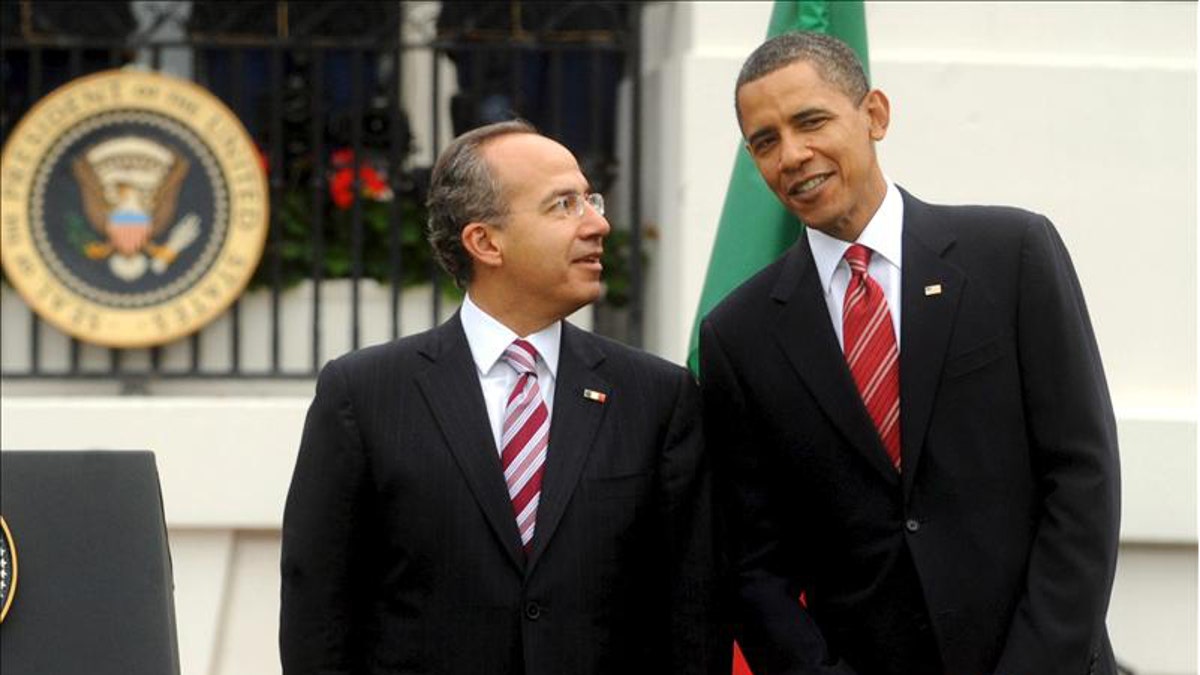
Thursday: President Obama poses for photos with Mexican President Felipe Calderon.
WASHINGTON --Libyan leader Muammar al-Qaddafi has lost legitimacy to lead and he must leave, President Obama said Thursday as the Pentagon confirmed the Libyan "mad dog" was using air power to strike rebel forces who refuse to settle for less than his ouster.
"Let me just be very unambiguous about this: Col. Qaddafi needs to step down from power and leave. That is good for his country that is good for his people that is the right thing to do," the president said during remarks to reporters alongside Mexican President Felipe Calderon.
But Venezuelan President Hugo Chavez may throw a wrinkle in U.S. and international ambitions offering to negotiate a way to salvage Qaddafi's regime through mediation between the Libyan dictator and the rebel National Libyan Council.
Venezuela's Information Minister Andres Izzara told Reuters that Libya had accepted a proposal "to work for a negotiated end to the conflict accompanied by an international commission." Izzara said Venezuela will discuss "formulas for peace in Libya" with Arab allies.
Rebel forces say no way.
"No one has told us a thing about it and we are not interested anyway. We will never negotiate with him," rebel spokesman Abdul Hafif Goga told The Guardian.
The U.S. is still using a combination of sanctions, diplomatic pressure and humanitarian aid to force out Qaddafi, but Obama noted that "there is a danger that a stalemate over time could be bloody."
The president said the U.S. "is looking at every option out there" to persuade Qaddafi to go away.
"There's a whole range of options, military and non-military, that we're examining, and we'll be making these decisions based on what's best for the Libyan people and how can we make sure we're minimizing the harm to innocent civilians in the process," the president said.
Noting that the U.S. has taken a leadership role in working with the international community to press for Qaddafi's ouster, the president added that the U.S. will provide military planes to help Egyptians who fled to the Libya-Tunisia border to return home. The U.S. is also weighing other means of assistance.
Obama's comments were the first time he has had appeared in person to call for Qaddafi to leave.
The Pentagon confirmed Thursday that the Libyan government has used air strikes against rebel forces, a finding that could bolster those calling for a U.S. and NATO no-fly zone over the embattled region.
Rebel leaders have urged that the U.N. impose a no-fly zone, preventing Qaddafi from aerial strikes, but the Pentagon said the new evidence has yet to compel the U.S. and NATO to act.
"Irrespective of whether air has been used or not, the ongoing discussion about what the U.S. and others might do doesn't change," said Pentagon spokesman Col. Dave Lapan. The decision is "not hinged upon whether air (power) is being used or not."




